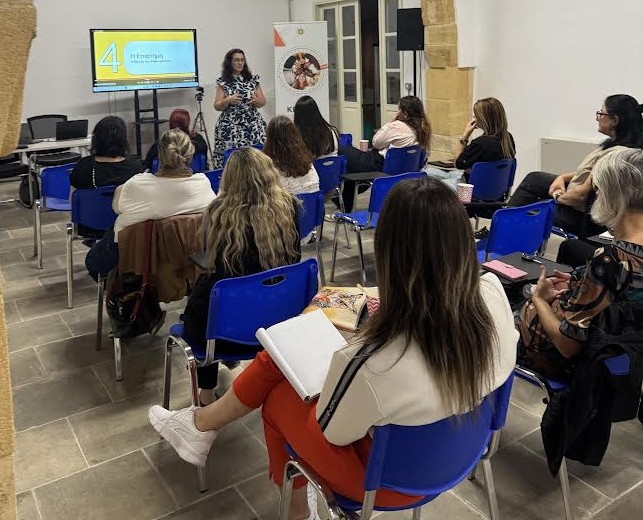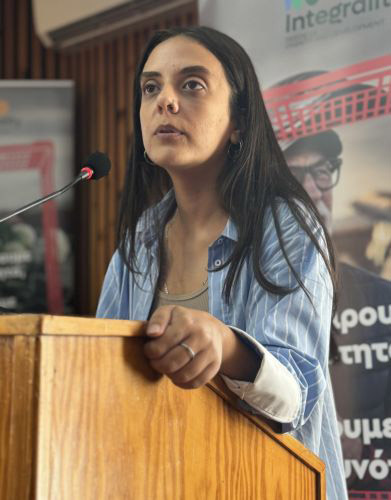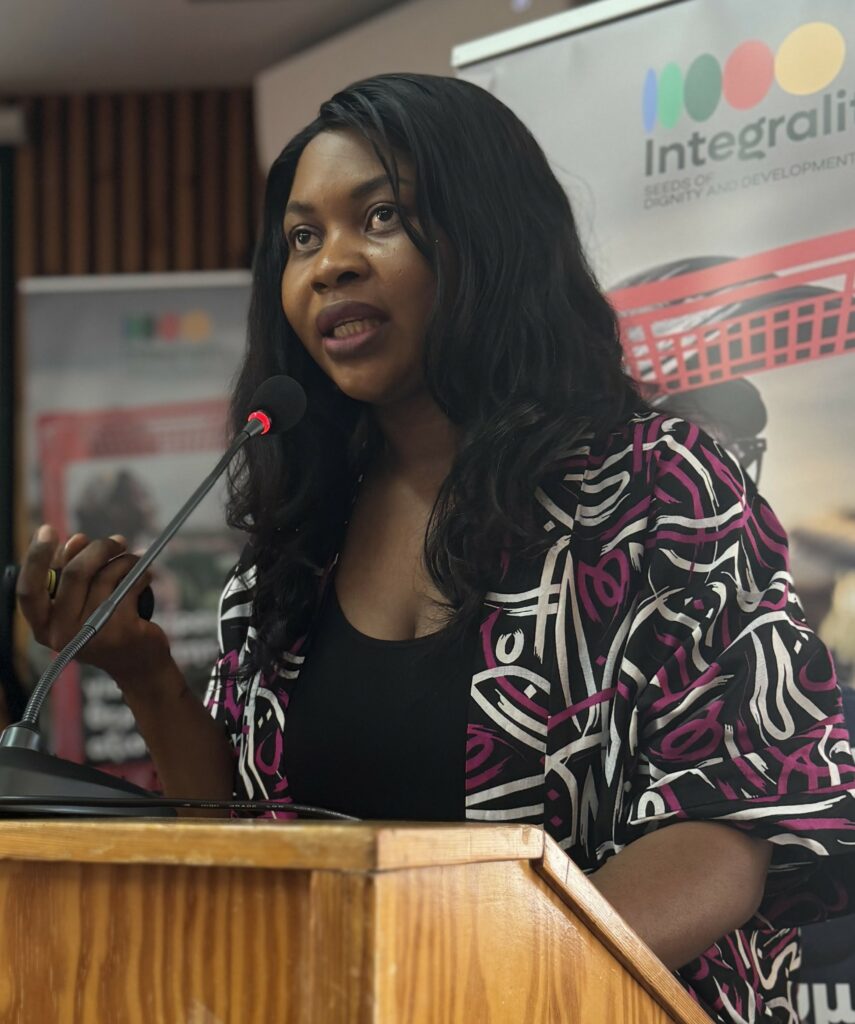Filenews 2 November 2025 - by Marios Demetriou
"The fight against trafficking in human beings must be holistic, gender-based and based on human rights and human dignity and therefore we must aim to reduce demand and follow the money, through the cooperation of local, national authorities, but also between countries", stressed the officer of the Office of the Commissioner for Gender Equality, Niovi Georgiadis, in a greeting on behalf of Commissioner Joyce Christodoulou, at the educational workshop on "Trafficking in Cyprus: Work – Migration – Geopolitics", which took place on Thursday 30 October 2025 at the Cyprus Red Cross event hall in Nicosia.
It was a multi-faceted event, organized by the non-governmental organization Center for Social Innovation (CSI), the Nicosia Development Agency (ANEL) and the Association of Social Workers of Cyprus, in the framework of the European project "INTEGRALITY – Multilateral strategies to promote integration and legality of employment of migrants in agriculture", which is co-financed by the European Union's Asylum, Migration and Integration Fund. "INTEGRALITY" was presented by the European Union project manager Maria Hadjidaniil on behalf of ANEL, stating that the partners in the project, along with Cyprus, are Greece, Italy, Portugal and Austria and that "its general goal is to contribute to the integration and integration of refugees and migrants from third countries, in the agri-livestock sector". A video message for the International Day Against Trafficking 2025 (which is October 18 of each year), was sent to the conference by Ghada Waly, Executive Director of the United Nations Office on Drugs and Crime (UNODC).

"Legal" exploitation and illegal victimization
Through the interventions of the speakers, who were more than ten, a multifaceted approach to the phenomenon of trafficking and its various manifestations was presented. As the representative of CSI, lawyer Vangelis Gettos, who coordinated the event, pointed out, "labour exploitation can be 'legal', while trafficking is a priori illegal", adding that "in labour exploitation, there is consent of the employee, while in trafficking, the freedom of will of the exploited is violated".
Reference to this aspect was also made in her speech at the event by the executive secretary of PEO, Marina Koukou Stavrinou, who said that "labour over-exploitation is not always "illegal" on paper, but violates human dignity. It is underpayment or no payment, working without permits/insurance, poor housing and health conditions, fear of dismissal or deportation. On the other hand, labour trafficking is forced labour, through fraud, pressure, threats or deprivation of liberty and includes the confiscation of documents, threats of deportation, dependence on the employer for shelter and food and on private employment agencies." The conference was particularly aimed at frontline professionals and entrepreneurs from all sectors of the economy and civil society, who come into contact with migrant workers, who face the risk of victimization.

Social workers and the state shelter
"Social work is the link between the victim of human trafficking and the services that can be offered to him or her health, housing, psychological support, education, legal assistance," said Dr. Koulla Erotokritou from the Association of Social Workers of Cyprus in her introductory statement, speaking about the role of the social worker "as a catalyst for preventing and dealing with trafficking".
He underlined that "it is not easy, the effort of the social worker, to ensure that nothing will be lost in the bureaucracy and that the care will be continuous, complete, humane". Dr. Erotokritou stressed that "no effort can stand without cooperation. No professional, no service, no body, can operate in isolation. Only through coordination, common discourse and continuous communication between public structures, NGOs, local government, justice, police, health workers and teachers, can we offer substantial protection and rehabilitation. Trafficking will not stop on its own. It will stop when society decides not to tolerate it anymore. So, let's continue to act as catalysts for change, to be the voice, the bridge, the force that inspires and supports. Because every time a person regains his freedom, we all gain a little of our own humanity."
The officer of the Social Welfare Services, Angela Ioakeim, spoke about the risk of re-victimization, the stigmatizing identity and the empowering status of the survivor of human trafficking, woman or man, making special reference to the state shelter for women victims of sexual exploitation, which is, as she said, "one of the available housing options for victims, for the purposes of their protection and support». He stated that it has a capacity of 15 places and that in 2023 and 2024, 16 and 18 people respectively were accommodated in the state shelter. "Provided - he added - that only women can be accommodated in the state shelter, in case the potential victim is a man, other arrangements are made, e.g. arrangement of temporary accommodation to a friend or relative, or approval is granted for temporary accommodation of the person, in a hotel/accommodation (the most economical and advantageous to the state)". Ms. Ioakeim said that two years ago, the Human Trafficking Victims Management Unit was established, an interprofessional specialized team that operates on a nationwide basis and is housed in the state shelter in the province of Nicosia.

Gender dimension, customers, financial gain
"Very aptly, the title of the conference bears the triptych of work, migration and geopolitics" pointed out Niovi Georgiadis, adding that "the European Union, the United Nations and other international and multilateral organizations have linked poverty, violence and discrimination with trafficking in human beings, stating that inequalities, within and between states, migration policies, Conflict and the growing demand for cheap labour and sex are some of the root causes of the phenomenon." Pointing out that "in Cyprus, human trafficking, as a violation of human rights and a form of organized crime, is provided for and criminalized, through the relevant legislation", Ms. Georgiades referred to the forms of human trafficking.
''A deeper analysis – he said – shows that victims of sexual exploitation are mainly women, while victims of exploitation through forced labor are to a greater extent men. According to a recent publication of the European Statistical Office on trafficking in human beings for the decade 2013 – 2023, the majority of recognized victims of trafficking were women. However, there was a significant increase in male victims. It cannot be examined piecemeal, as it is often hidden behind other crimes or phenomena. It is directly linked to prostitution, pornography and other forms of gender-based violence. In this context, demand and economic profit are two critical factors that need to be discussed. Who benefits from the victims and how? In other words, who does the demand concern? Human trafficking concerns the coercion of people for the sole purpose of illegal, quick financial gain for pimps, employers and specifically sexual exploitation, customers, who are mostly men, with the aim of demonstrating their power over the bodies of women and girls." From the Office of the Commissioner for Administration, officer Melina Tringidou spoke at the event on "Legislative provisions and institutional materialities: theory under the control of practice".
Empowerment, not pity, is needed by survivors
Of particular interest was the intervention of Irene Che, leader of survivors (former victims) of human trafficking, president of the Advisory Council of the non-governmental organization Step Up Stop Slavery in Nicosia, who reminded that "survivors are not just witnesses, they are experts in lived reality". And he added, among other things: "The true reintegration of survivors requires their empowerment and not pity. Real change requires cooperation between government, trade unions and civil society. Cyprus must include the voices of survivors, at every level of its response, against trafficking in human beings, which is not a question of borders, but a question of justice. Protection means dignity, fair work and humanity for all. And true prevention begins when vulnerability ends. Invisible hands build our homes and nourish our nations and deserve visibility and justice. Legality does not equate to justice, since exploitation can be hidden within legal systems. These are restrictive immigration systems, which create vulnerability traps. When people are prevented from having legal pathways, they are pushed into victimization. The delays in the issue of asylum and in the examination and granting of work permits intensify dependence and fear. Prejudice blinds justice. For example, the request of African women for asylum is very often rejected because they are not believed. When protection systems fail, traffickers don't have to look for victims – the system delivers them." Korina Drousiotou, senior legal officer of the Cyprus Refugee Council, spoke at the conference about trafficking as a basis for a request for international protection.
The Green Line and "Cypfruvex" in Morphou
''The Green Line is a factor that perpetuates human trafficking," said Deniz Altıok, program coordinator at the Turkish Cypriot "non-governmental" organization Human Rights Platform, which recognizes victims of trafficking in the occupied territories, conducting ad hoc checks, based on international protocols. He added, among other things, the following: "Where the law stops, exploitation begins. The acquis of the European Union applies only to the Republic of Cyprus. The northern part of Cyprus has no formal alignment with EU frameworks, or international frameworks, against trafficking in human beings. There are no harmonized inspections, or immigration regulations, and therefore, the protection systems are weak." Ms. Altıok spoke of "workers hired from abroad, with false promises. There is - he added - evidence of passport confiscations, withholding of wages, overcrowding in places of residence, inaction of the "authorities", despite clear indicators of human trafficking." He also referred to the "Cypfruvex case", which concerns the inhumane exploitation of hundreds of immigrants from Bangladesh, victims of labour trafficking in occupied Morphou, by the "semi-state" citrus export company Cypfruvex, whose employees took their passports, placed them in labour camps and forced them to work seven days a week and 12-13 hours a day, often without pay and under miserable conditions. The case was revealed in August 2024 by the organization "Human Rights Platform", while a relevant condemnatory report was made in September 2025 by the United Nations Human Rights Council based in Geneva.
Places of exploitation and digital deception
In her own statement at the conference, Lieutenant Eleni Michael, head of the Office of Combating Trafficking in Human Beings (GEP) of the Police, referred to the US Department of State's 2025 annual report on trafficking in human beings in the world, for the period April 2024 – March 2025, which was released in September 2025, according to which, the Republic of Cyprus remained – for the fourth consecutive year – in the honorary category 1 (tier 1), countries that meet the minimum criteria for the eradication of trafficking in human beings https://www.state.gov/.../2025-trafficking-in-persons.../. He said that "countries of origin of victims in Cyprus are Romania, Bulgaria, Ukraine, China, Bangladesh, India, Pakistan, Egypt and Cyprus, while places of exploitation in the free areas are beer gardens, massage and beauty salons, apartments, hotels, street prostitution, modelling agencies, escort services, construction industry, factories, agriculture-livestock and domestic work". Labour trafficking in Cyprus was the subject of the speech of Paraskevi Tseou, executive president of the organization Cyprus Stop Trafficking, who referred, among other things, to new methods of exploitation, on the part of traffickers, through digital deception, with the use of the internet and social media, where they publish false, attractive job ads." He added that "the people most at risk of being victimized at work are domestic workers and workers in agriculture, livestock, industry and entertainment venues." Regarding the measures to prevent labour trafficking, the director of the Department of Labour at the Ministry of Labour, Alexandros Alexandrou, referred to his intervention, whose speech was read by the officer of the department, Pandora Matsouka.
